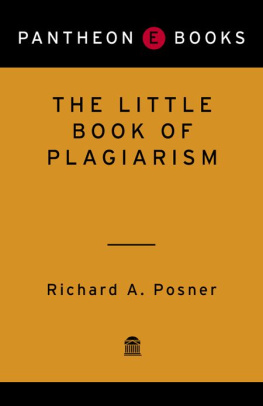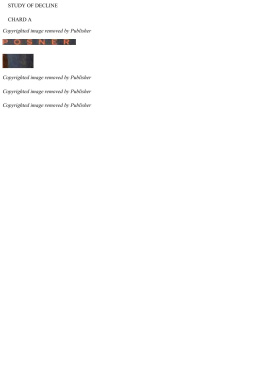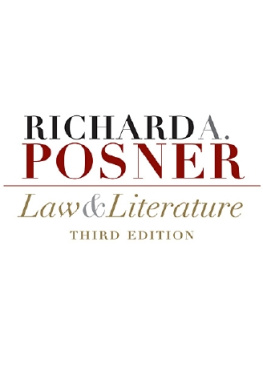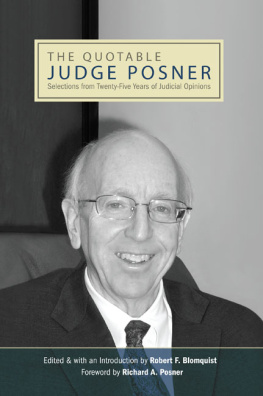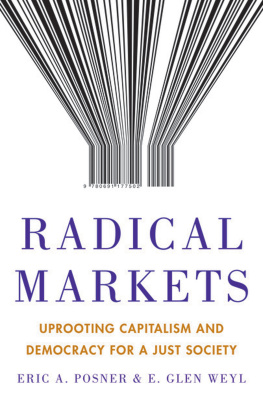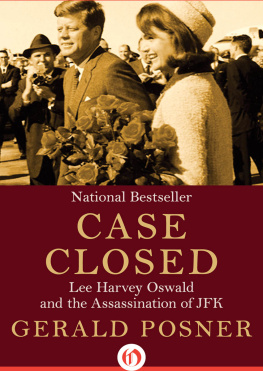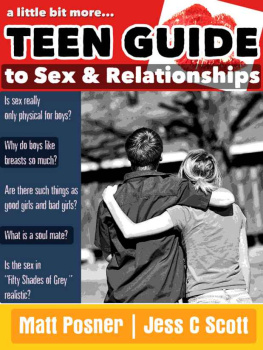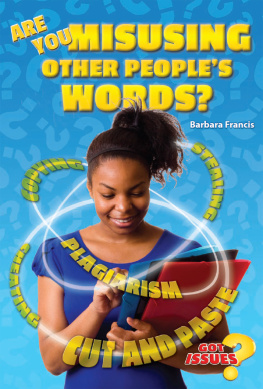Richard A. Posner - The Little Book of Plagiarism
Here you can read online Richard A. Posner - The Little Book of Plagiarism full text of the book (entire story) in english for free. Download pdf and epub, get meaning, cover and reviews about this ebook. year: 2007, genre: Science. Description of the work, (preface) as well as reviews are available. Best literature library LitArk.com created for fans of good reading and offers a wide selection of genres:
Romance novel
Science fiction
Adventure
Detective
Science
History
Home and family
Prose
Art
Politics
Computer
Non-fiction
Religion
Business
Children
Humor
Choose a favorite category and find really read worthwhile books. Enjoy immersion in the world of imagination, feel the emotions of the characters or learn something new for yourself, make an fascinating discovery.
- Book:The Little Book of Plagiarism
- Author:
- Genre:
- Year:2007
- Rating:4 / 5
- Favourites:Add to favourites
- Your mark:
- 80
- 1
- 2
- 3
- 4
- 5
The Little Book of Plagiarism: summary, description and annotation
We offer to read an annotation, description, summary or preface (depends on what the author of the book "The Little Book of Plagiarism" wrote himself). If you haven't found the necessary information about the book — write in the comments, we will try to find it.
The Little Book of Plagiarism — read online for free the complete book (whole text) full work
Below is the text of the book, divided by pages. System saving the place of the last page read, allows you to conveniently read the book "The Little Book of Plagiarism" online for free, without having to search again every time where you left off. Put a bookmark, and you can go to the page where you finished reading at any time.
Font size:
Interval:
Bookmark:

ALSO BY RICHARD A. POSNER
Not a Suicide Pact
Uncertain Shield
Preventing Surprise Attacks
Catastrophe
Law, Pragmatism, and Democracy
Economic Analysis of Law
Frontiers of Legal Theory
Antitrust Law
The Problematics of Moral and Legal Theory
An Affair of State
Overcoming Law
Sex and Reason
The Problems of Jurisprudence
The Economics of Justice

For Charlene
Pereant qui ante nos nostra dixerent.
Perish those who said our good things before we did.
Donatus
A T AGE SEVENTEEN, Kaavya Viswanathan signed a two-book contract with Little, Brown. The publisher agreed to give her an advance of $500,000 against royalties, and she sold movie rights to the books to Dreamworks for an undisclosed sum. By the time the first book, How Opal Mehta Got Kissed, Got Wild, and Got a Life, was published in April 2006, she was nineteen and a sophomore at Harvard. Within weeks the Harvard Crimson discovered and the mainstream media proclaimed far and wide that her book reproduced almost verbatim many passages from similar chick-lit novels by an established author, Megan McCafferty. A company engaged in the heretofore obscure trade of book packaging had helped Viswanathan to conceptualize and plot her book, but there is no indication that the company shares responsibility for her plagiarisms.
The Crimson listed thirteen plagiarized passages, such as the following. Viswanathan:
Priscilla was my age and lived two blocks away. For the first fifteen years of my life, those were the only qualifications I needed in a best friend. We had first bonded over our mutual fascination with the abacus in a playgroup for gifted kids. But that was before freshman year, when Priscilla's glasses came off, and the first in a long string of boyfriends got on.
McCafferty:
Bridget is my age and lives across the street. For the first twelve years of my life, these qualifications were all I needed in a best friend. But that was before Bridget's braces came off and her boyfriend Burke got on, before Hope and I met in our seventh-grade honors classes.
Viswanathan at first denied everything, then claimed that the copying was unconscious that she had internalized McCafferty's novels (which she admitted having read). She had a photographic memory, she said, though not for the copying itself. At first, Little, Brown said it would republish the book without the offending passages. But after Viswanathan was discovered to have copied material for her novel from other authors besides McCafferty, including Salman Rushdie, the publisher recalled the book and canceled its contract with her.
What was Viswanathan thinking when she plagiarized? The Associated Press has revealed that she had been featured in a 2004 Chronicle of Higher Education article detailing how even successful students are schmoozing' with [college] admissions officials to make themselves more memorable. Viswanathan was described as having visited nine exclusive colleges, following up with phone calls and monthly e-mails to admissions officers to underscore her interest. I think a lot of applying to college is about strategy,' Viswanathan told the magazine. When they read my application, maybe they'll remember me.' Apparently Harvard did. Strategy made her, and in the end strategy undid her.
Here is a kindlier explanation. In an age of specialization (perhaps in any age, as Harold Bloom argued in The Anxiety of Influence), a creative person is apt to have a feeling of belatednessa feeling that though just as creative as his predecessors he has appeared on the scene too late; the ship has sailed; the niche he might have filled has been filled already. Oh, the unfairness, Viswana-than might have thought, of McCafferty's having picked the low-hanging chick-lit fruit rather than leaving some of it for her.
Newspaper readers might think plagiarism a Harvard specialty. Doris Kearns Goodwin, who had taught part-time at Harvard for a decade and was a member of the university's Board of Overseers, and three Harvard law professors Laurence Tribe, Charles Ogletree, and Alan Dershowitzhad recently been accused, along with sophomore Viswanathan. Goodwin, as we'll see, made an incomplete and misleading confessionand was quickly rehabilitated (though plagiarists, I shall argue, are never completely rehabilitated). Tribe confessed and received a mild reprimand from his dean. In Ogletree's case the plagiarism was by a research assistant. His appears to have been a managed book, in which the (nominal) author is mainly the editor of others' prose. Ogletree received undisclosed discipline, but was not fired. Dershowitz, a prominent Zionist, was accused by anti-Zionists of citing primary sources without acknowledging that he had found the references to them in secondary sources that he did not cite. He denied the accusation, and that was the end of the matter.
One doubts that plagiarism is actually more common at Harvard than elsewhere. It is simply more conspicuous. Scandal at the nation's most famous university gratifies the natural human delight at discovering that giants, including giant institutions, have feet of clay.
Plagiarism, as the Viswanathan affair shows, can be a gaudy offense. It can also be a fabricated one. The suit for copyright and trademark infringement that Nancy Stouffer brought against J. K. Rowling, the author of the Harry Potter books, was so lacking in meritthe suit was found to have been based in part on forged and altered documentsthat the court imposed a $50,000 penalty on Stouffer. Plagiarism has sometimes a comical air, as when the University of Oregon plagiarized the section of Stan-ford's teaching-assistant handbook dealing with plagiarism. Both Jonathan Swift and Laurence Sterne denounced plagiarism in words plagiarized from earlier writers.
It is also an offense regularly committed by celebrities, though most plagiarists are obscure in fact most are students; an estimated one-third of all high-school and college students have committed plagiarism or a closely related form of academic fraud, such as purchasing a term paper from a paper mill. Still, a number of prominent, even illustrious, figures are confessed or proven plagiarists, includingbesides Sterne, Swift, Samuel Coleridge, and countless other literary authorsMartin Luther King Jr., Senator Joseph Biden, and Vladimir Putin. Another VladimirNabokovhas been accused of plagiarism, though, I shall argue, unjustly.
Plagiarism is attracting increasing attention, though whether this is because it is becoming more common, or because its boundaries are becoming vague and contested, or because it is being detected more often (digitization has made it at once easier to commit and easier to detect) are among the many questions about it that call for investigation. What makes plagiarism a fascinating subject and the occasion for this book is the ambiguity of the concept, its complex relations to other disapproved practices of copying, including copyright infringement, the variety of its applications, its historical and cultural relativity, its contested normative significance, the mysterious motives and curious excuses of its practitioners, the means of detection, and the forms of punishment and absolution. I shall analyze these issues from a perspective shaped by my longstanding interest, both as a judge and as an academic, in the law and economics of intellectual property.
Font size:
Interval:
Bookmark:
Similar books «The Little Book of Plagiarism»
Look at similar books to The Little Book of Plagiarism. We have selected literature similar in name and meaning in the hope of providing readers with more options to find new, interesting, not yet read works.
Discussion, reviews of the book The Little Book of Plagiarism and just readers' own opinions. Leave your comments, write what you think about the work, its meaning or the main characters. Specify what exactly you liked and what you didn't like, and why you think so.

